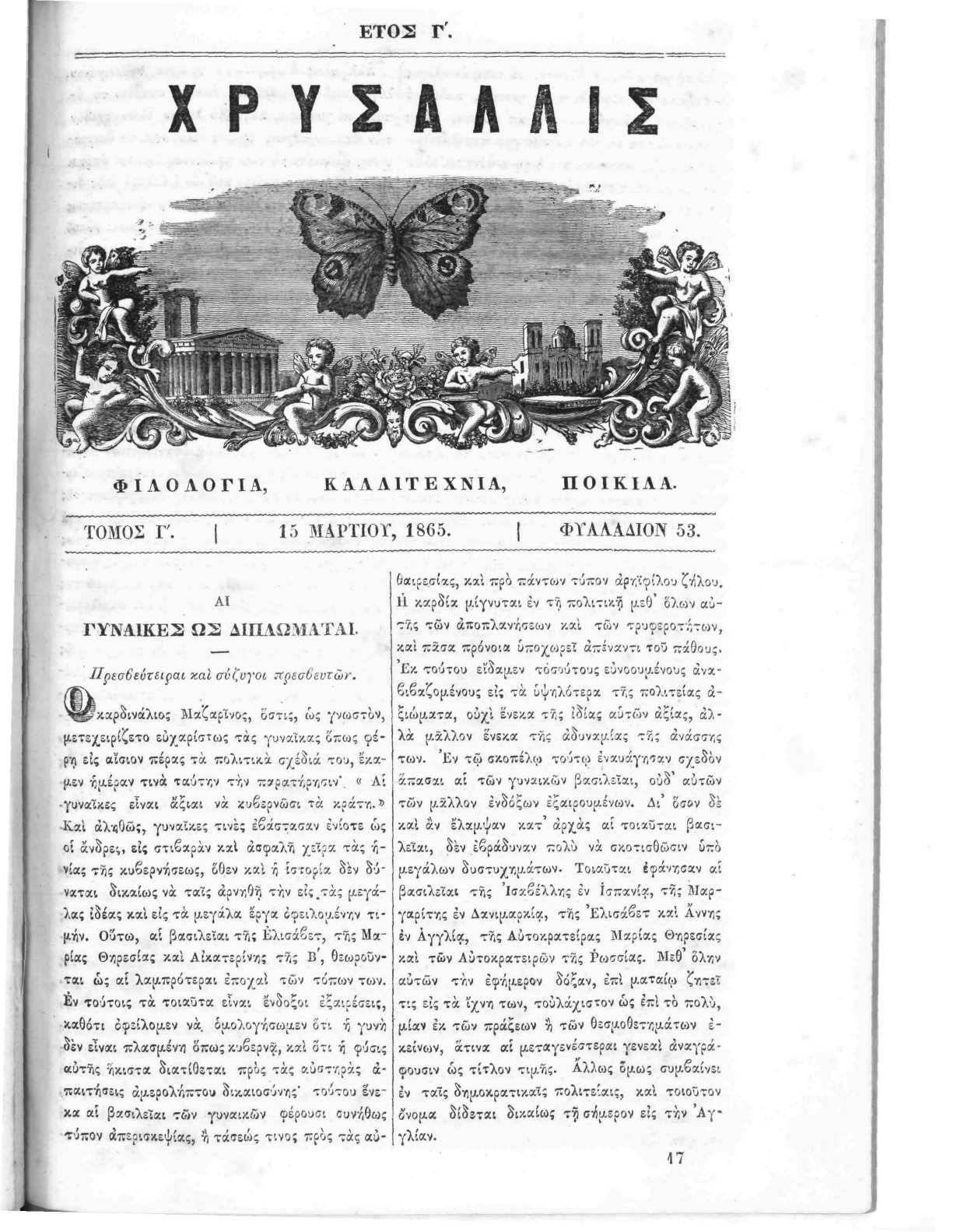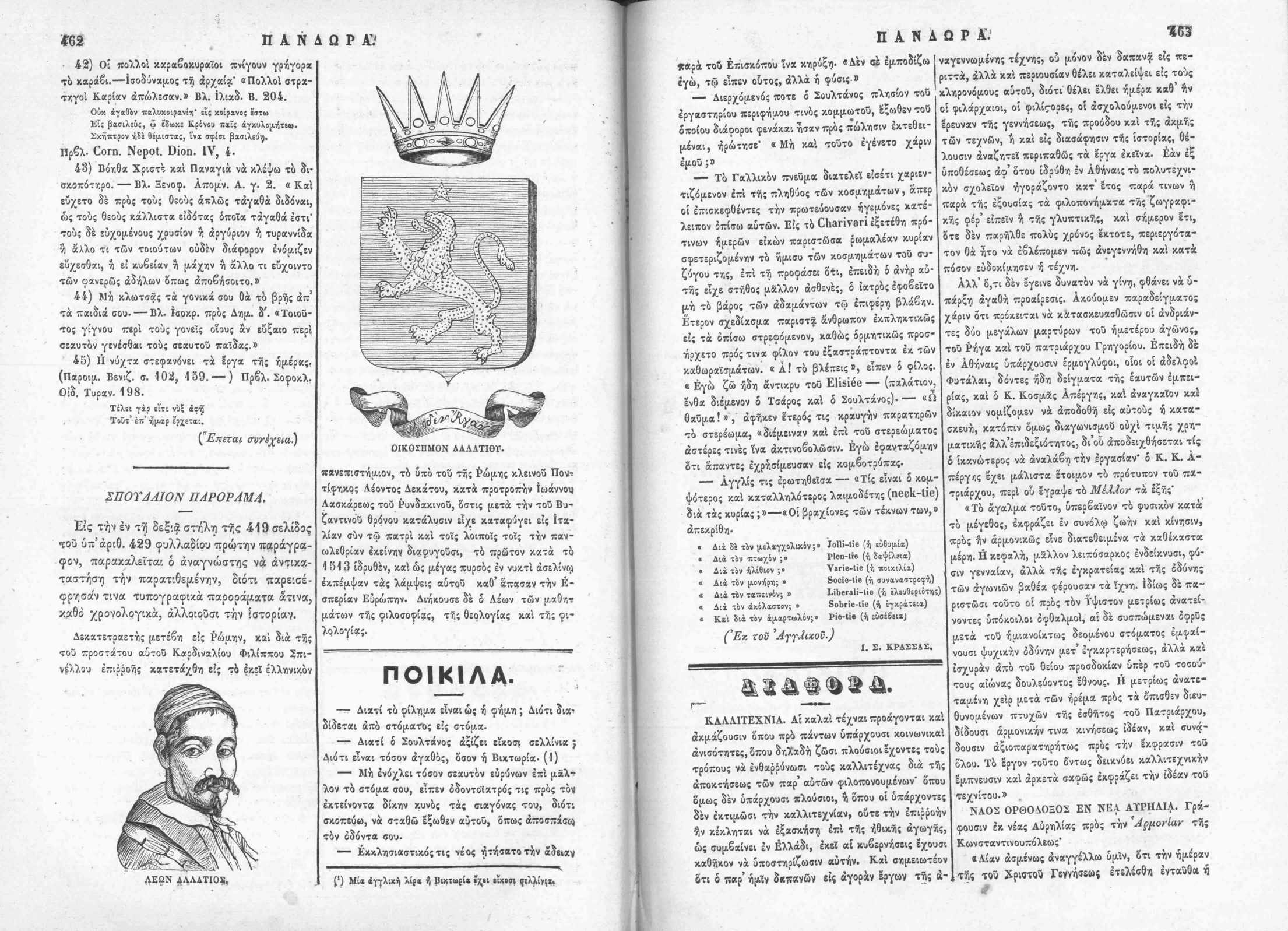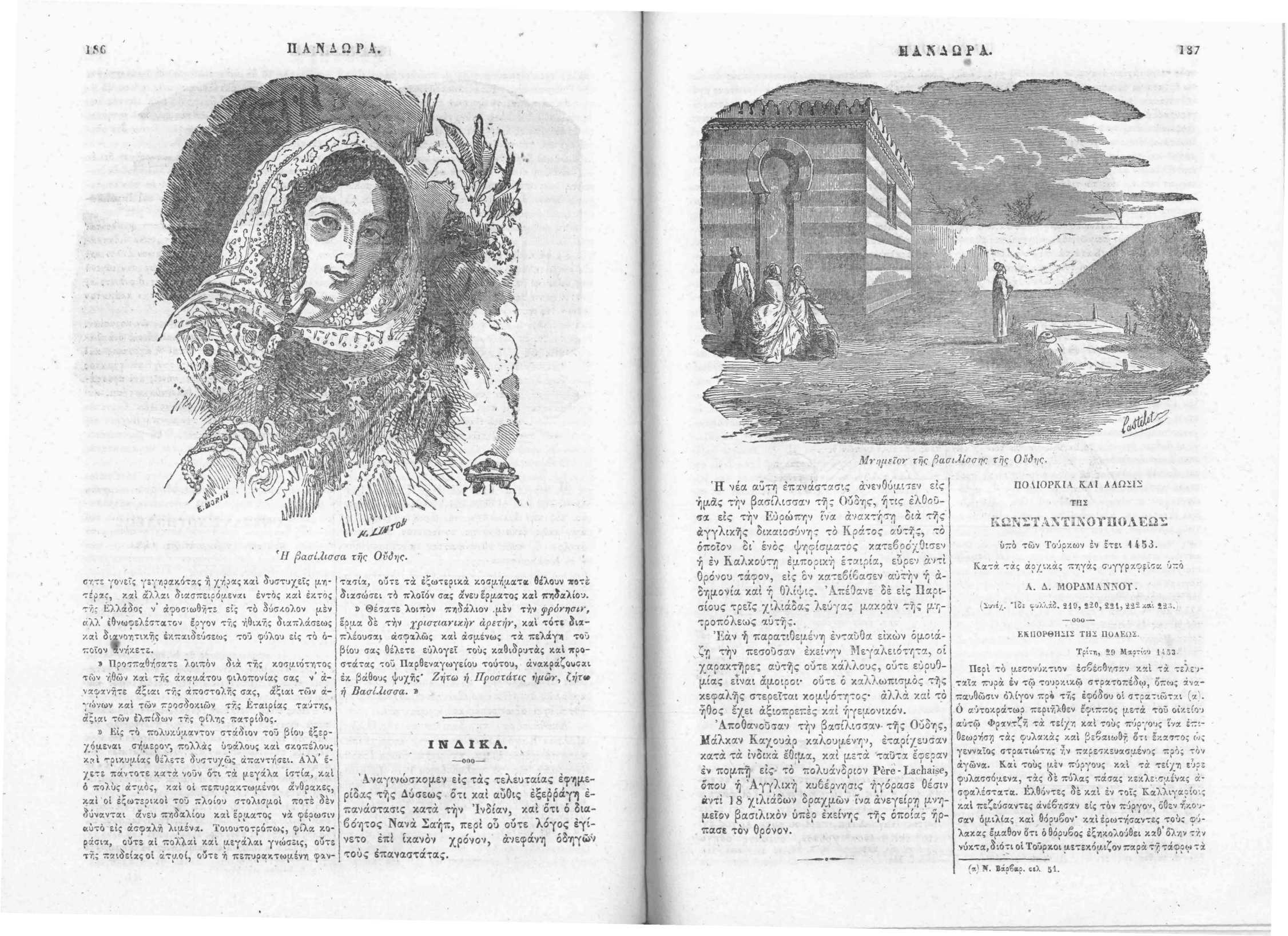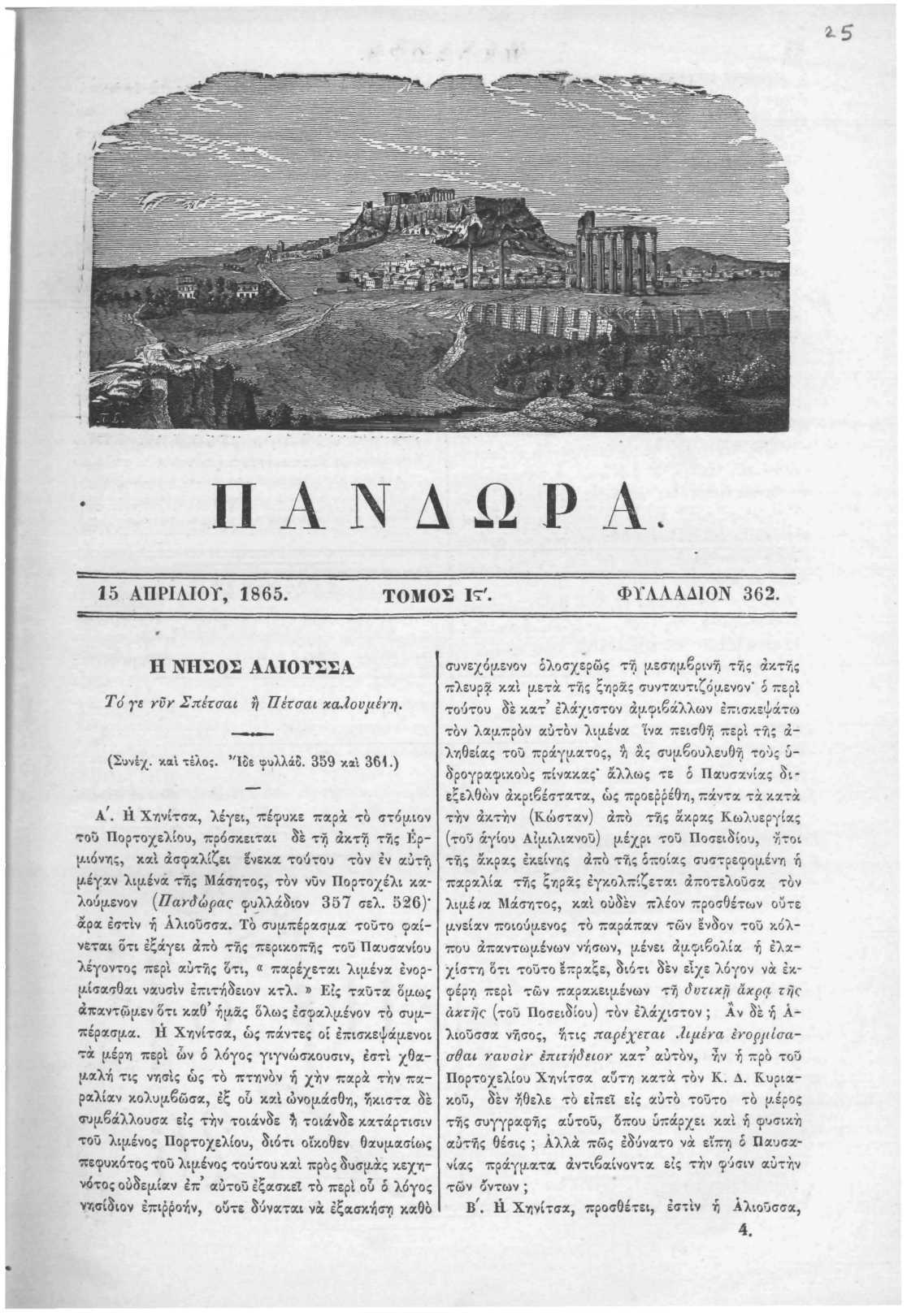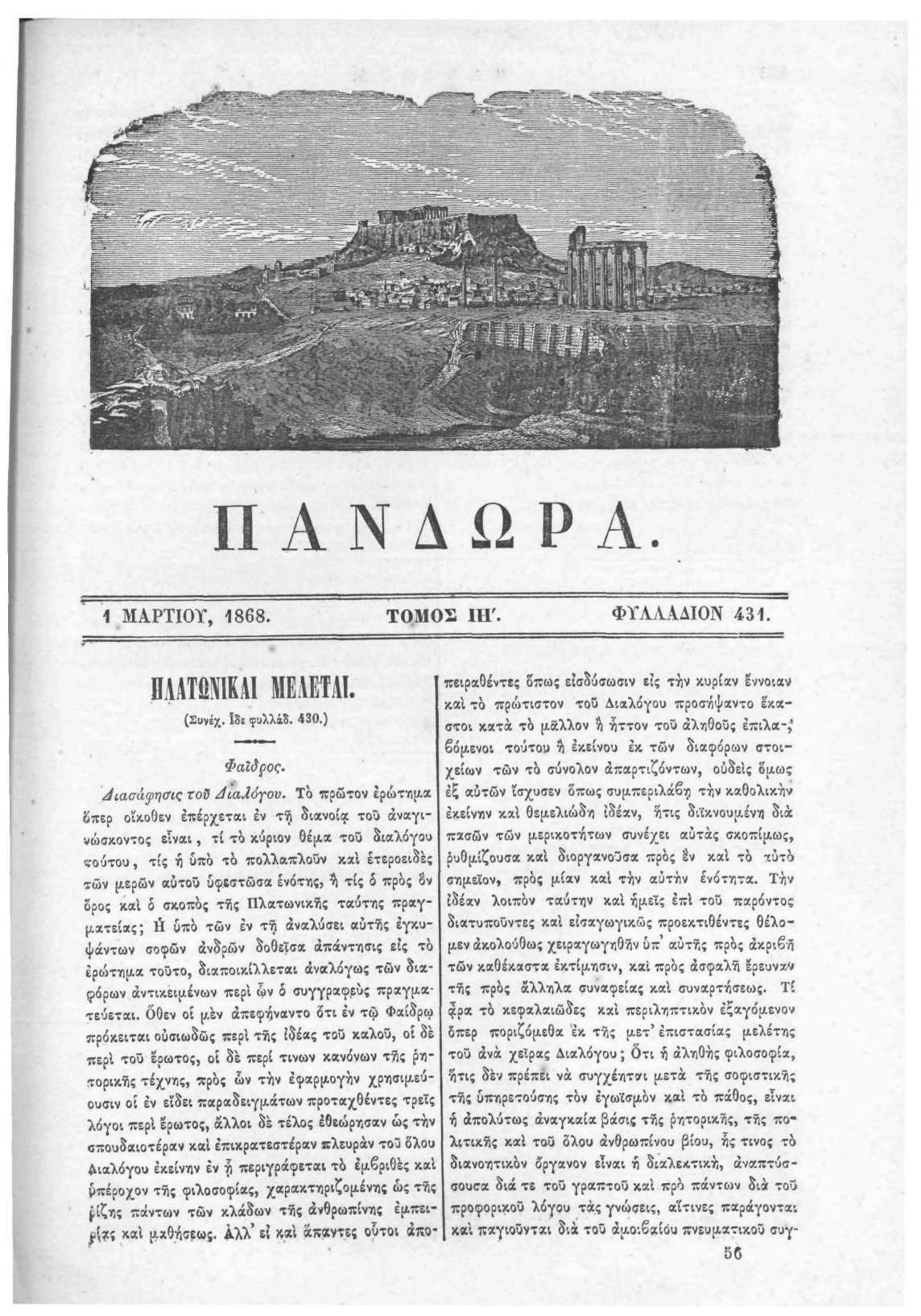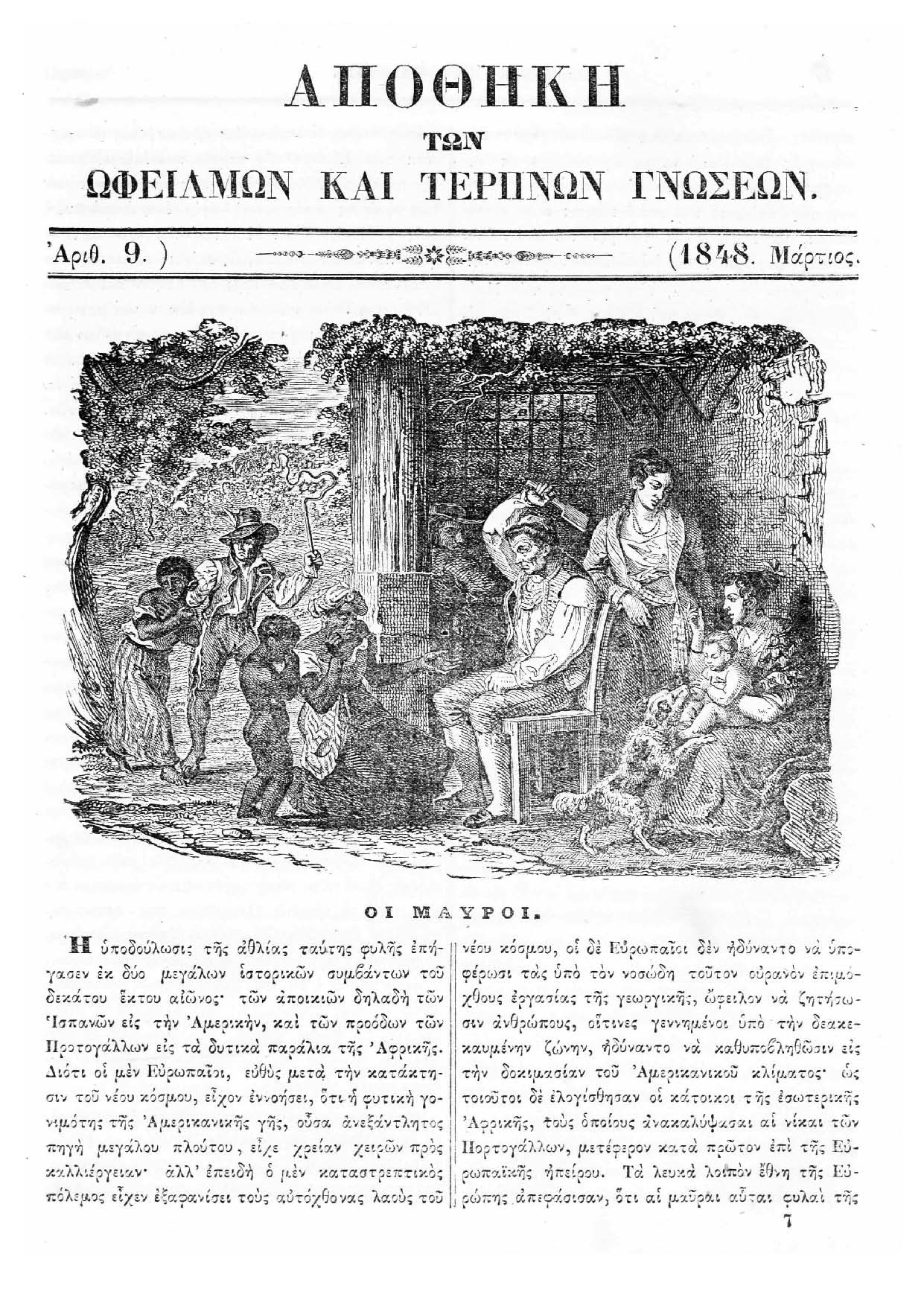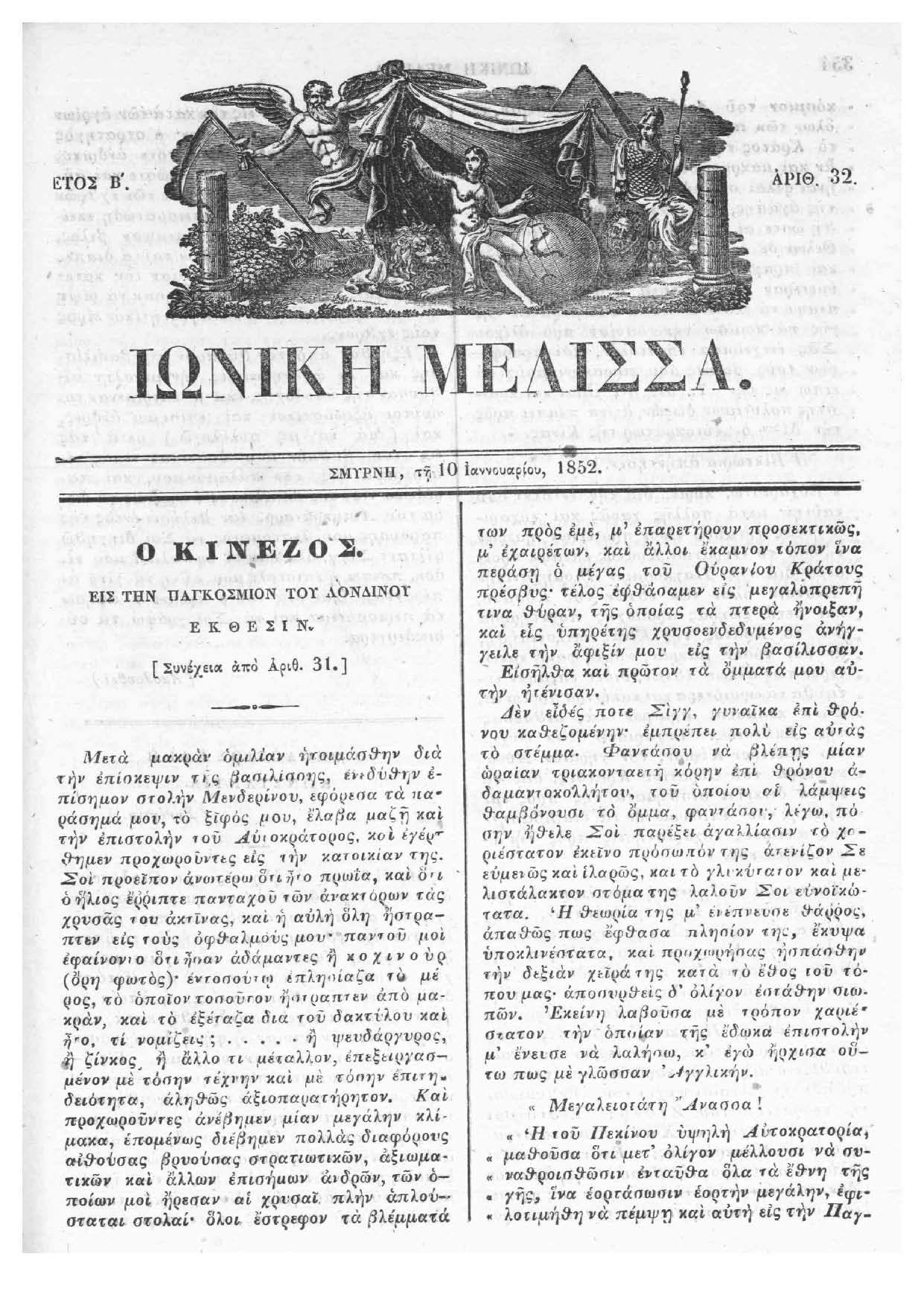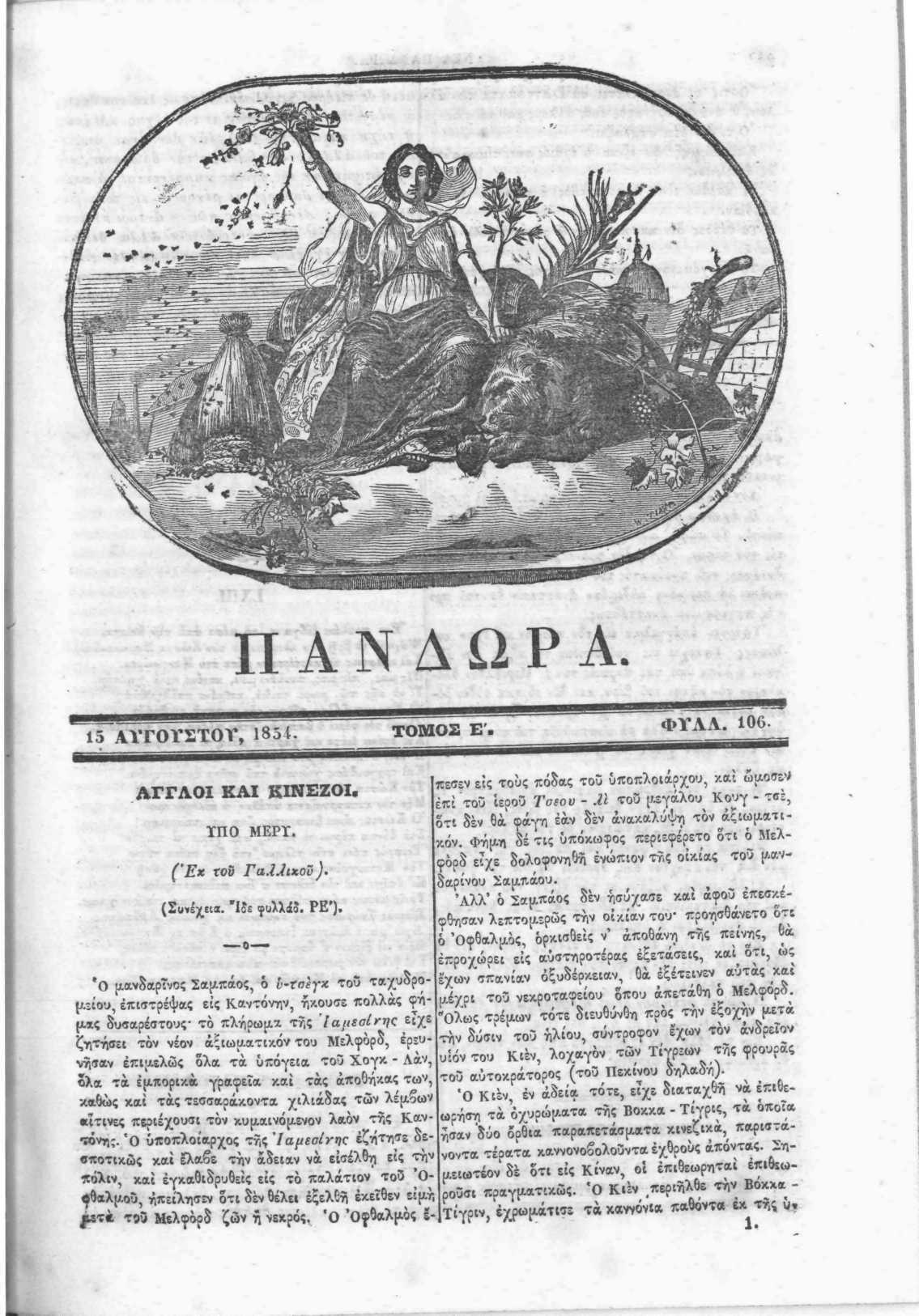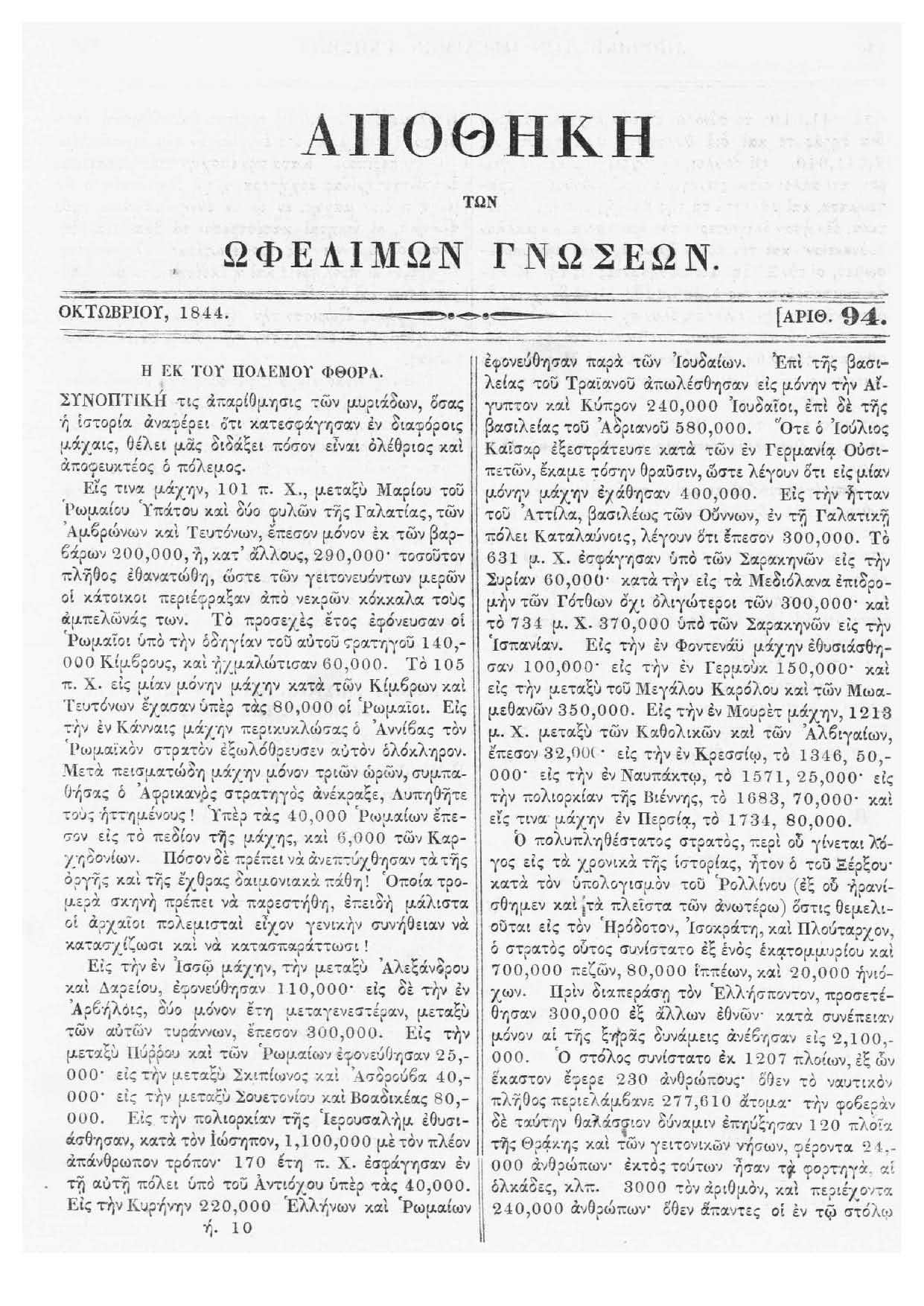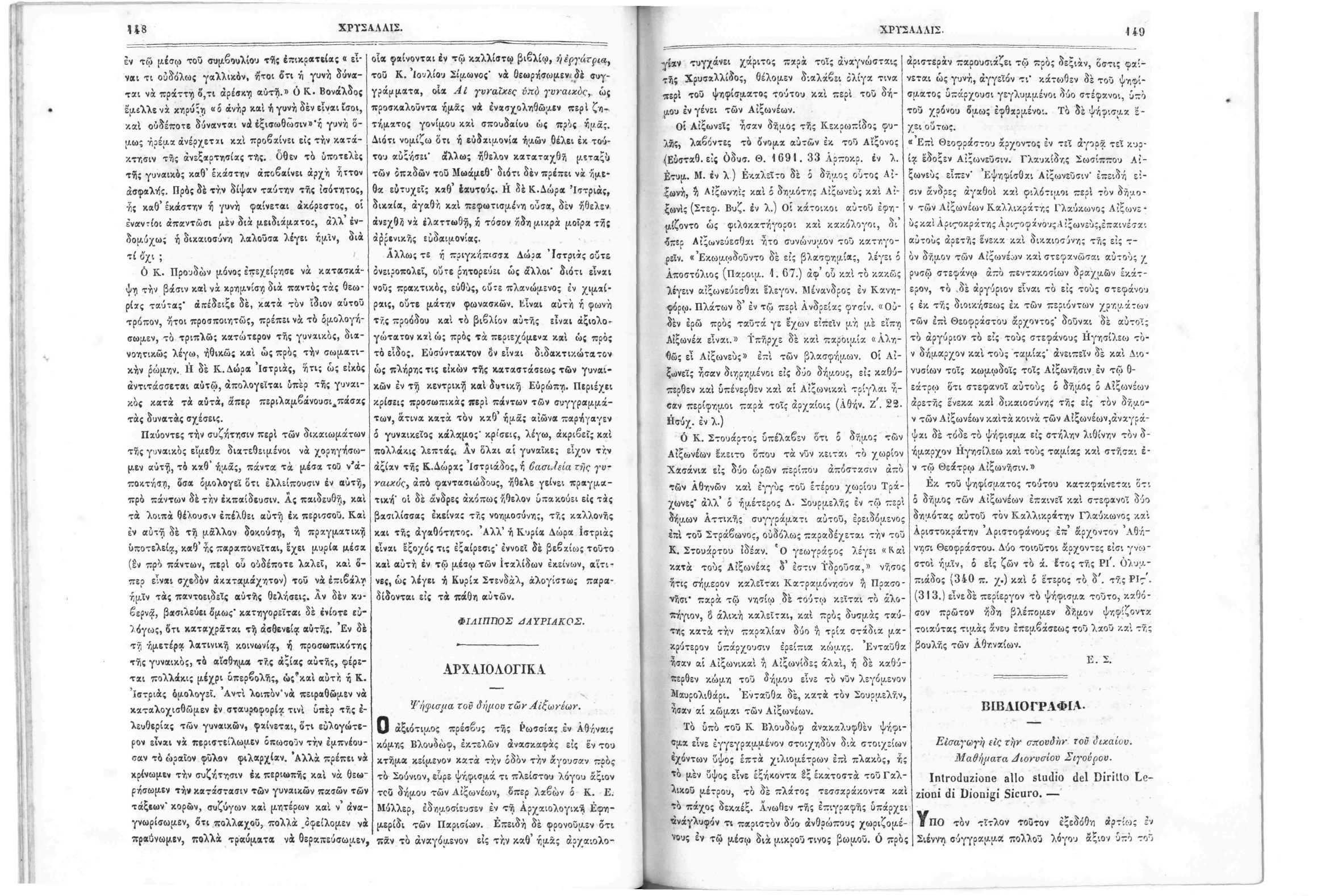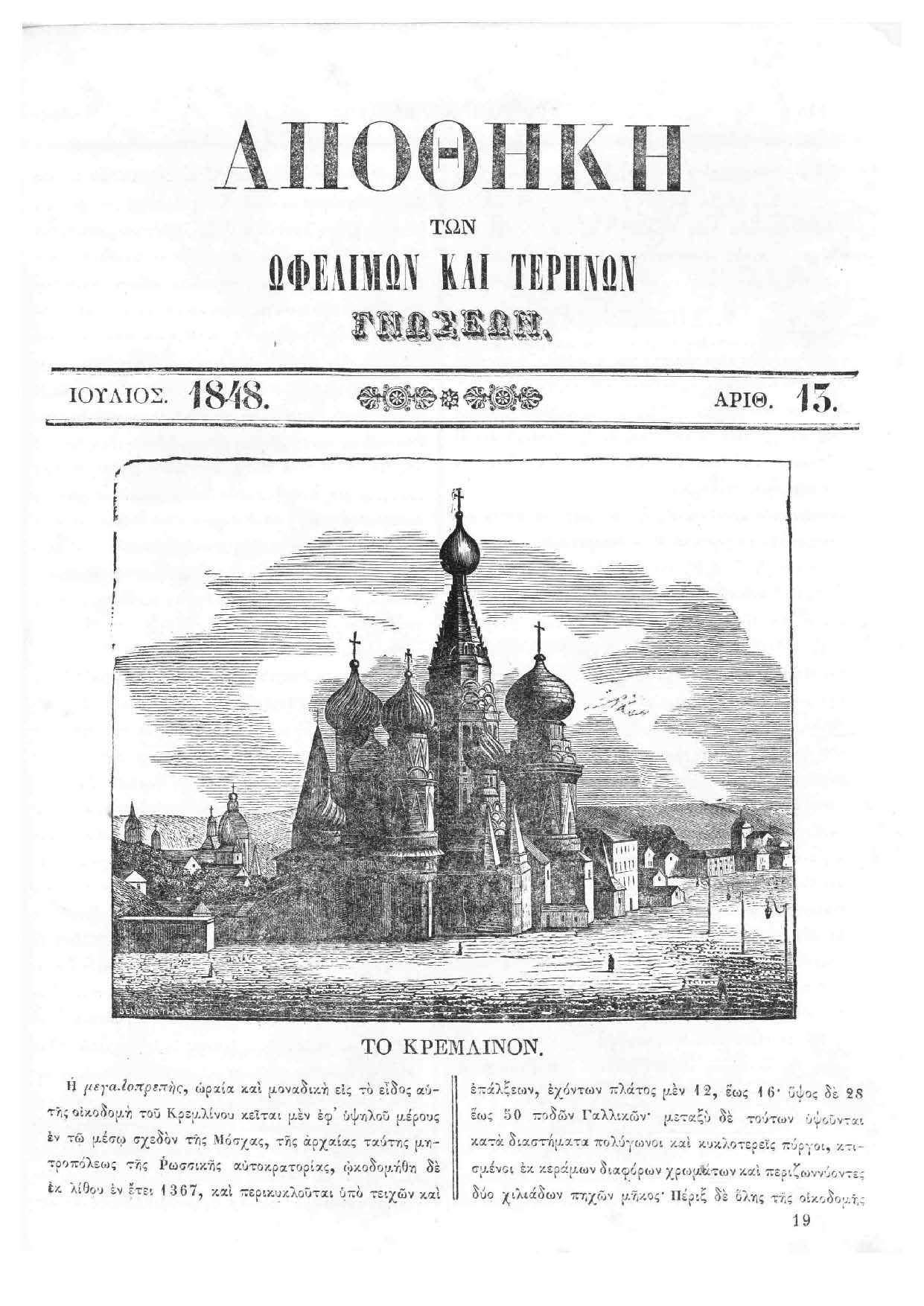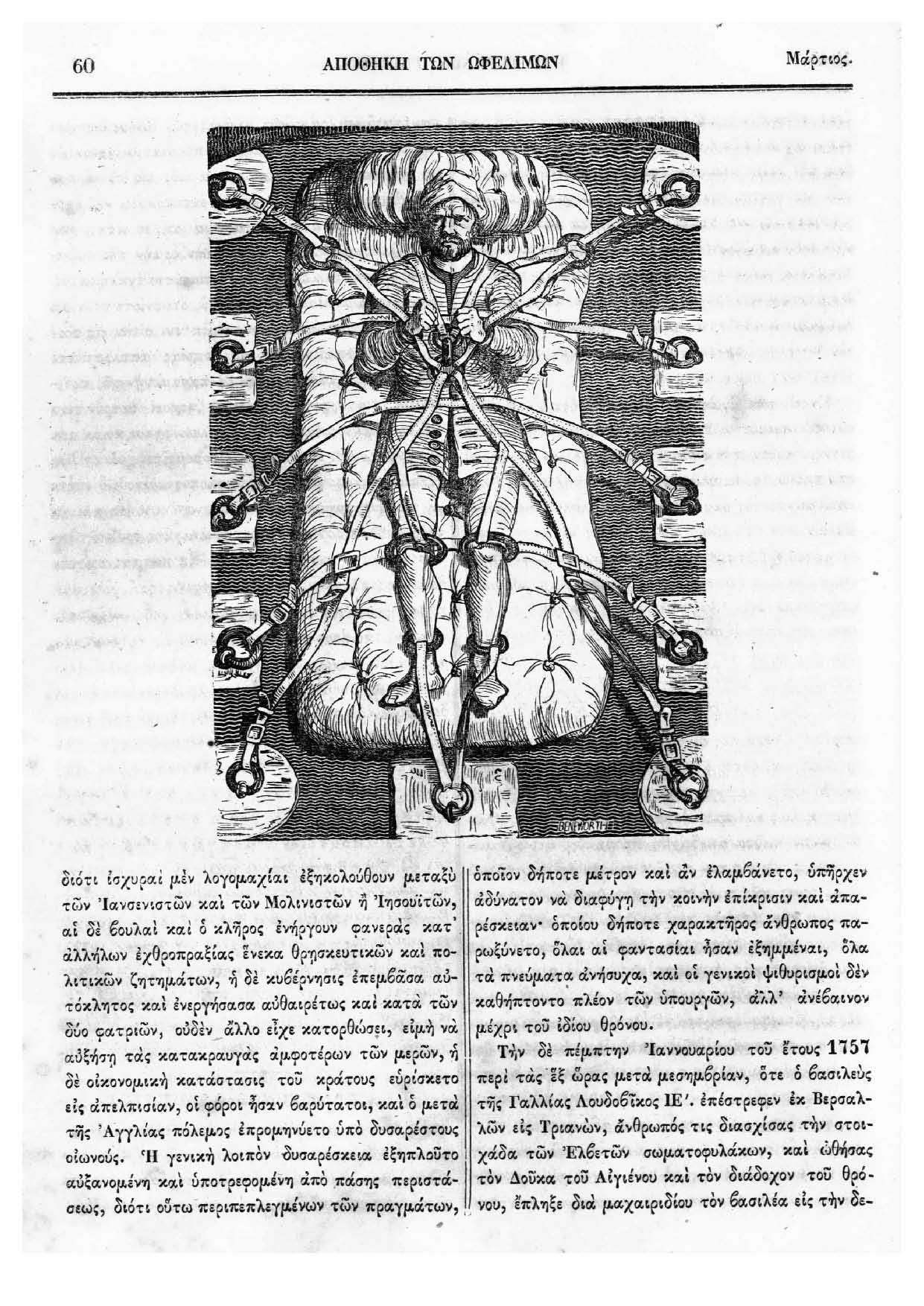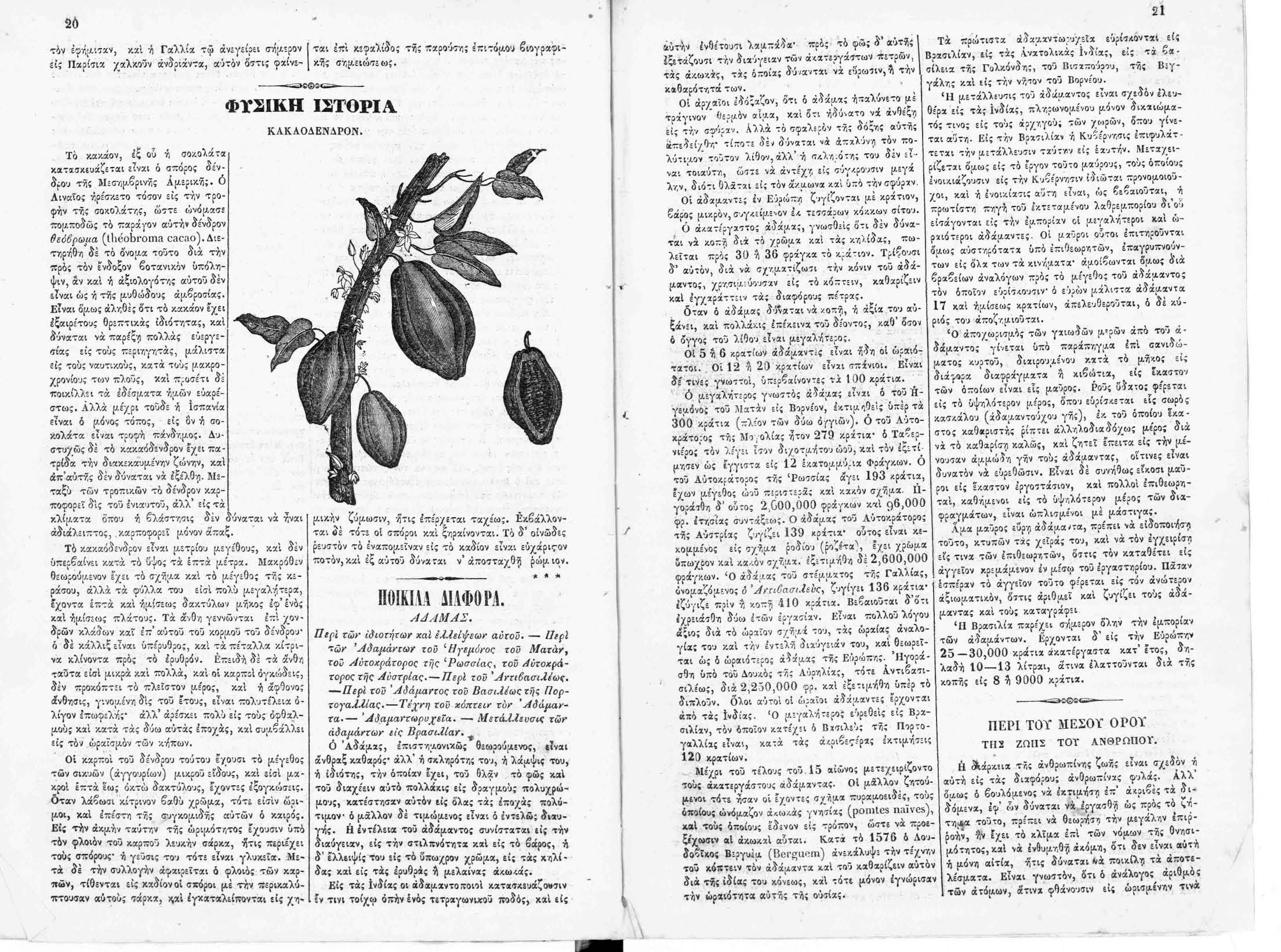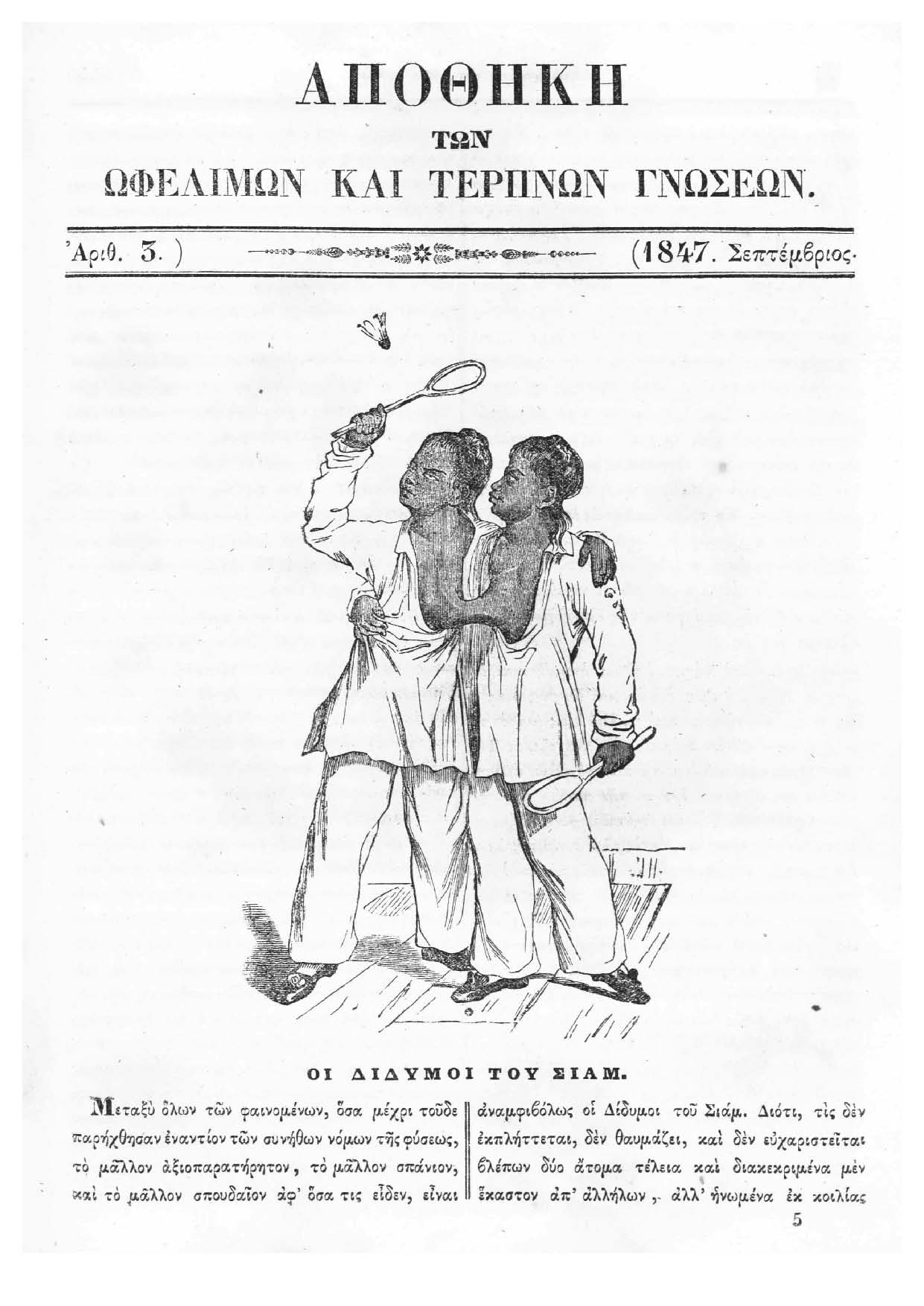Cultural transfer and ‘national character’ in nineteenth century Greek periodicals
Project concept and objectives
Recent international research has taken an intense interest in the subject of ‘national identity’ and its definition through cultural forms, viewed especially from a comparative and theoretical framework where the issue of translation features as crucial. In this context, the 19th century, the apogee of modernity forms the subject of many and increasing international studies resulting in a re-assessment of its cultural and political significance for the 20th century. At the same time, there has been a significant rise in research into international nineteenth-century press as the nodal point of the formation of and conflict among different cultural identities and paradigms.
The proposed research project further probes into periodicals and their important socio-cultural role in nineteenth century. The project is divided into the following three parts, undertaken by three research groups:
I. Cultural interchanges: literary genres, aesthetic and ideological trends
The nineteenth century marks a period of intense ideological and cultural contestation as well as socio-political fermentation which are inextricably connected with the formation and the consolidation of a national identity crucial to the self-definition of the newly-constituted Greek state. This latter process involved: a stronger identification with the ancient Greek past, a mid-nineteenth-century attempt at inscribing Byzantium in Greek national genealogies, the promotion of a Greco-Christian ideal suggesting the uninterrupted continuity of the Greek nation, and an ambivalent attitude toward the West (an Enlightenment-driven demand for catching up with Europe alongside the opposite demand of a national purity, free from Western influences).
A significant part of such pursuits and inquiries is inscribed in the flourishing periodical press of the time. The variety of periodical publications (general interest magazines, literary journals and/or family magazines) and their thematic breadth allow access to the collective consciousness of the period as these publications addressed themselves to a wide range of lay people, in contrast to the more scholarly readership of books. The ideological and aesthetic trends inscribed in the periodical material played a significant part in the formation of the corpus and character of modern Greek Letters, also marking its relation to ‘otherness’. The articles and the essays contained in these periodicals enhance the demand for the formation of a ‘national literature’ by contributing to their contemporary debates around the influence of imported literary products and currents, Hellenocentricism, the language question, and the revival of ancient prosody.
Even though there are significant studies of the periodical press, only a small number of periodicals has been fully indexed and qualitatively studied and assessed. The first research group will create a data-base common to all three groups of the proposed project with the aim of recording all the (original and translated) material published in the selected periodicals and the references to writers, texts, literary genres it contains. While processing such material, the group will focus on the ways in which certain ideological and aesthetic trends are received, revived or survive through time. The research group will also focus on the identification of the terms contributing to the definition of the different literary genres (lyric poetry, novels, short stories, chronicles, literary criticism, historical narratives, historiography, historical or fictional biography, etc).
II. The reception of theatre genres (authors, ideological and aesthetic currents, drama theory): poetic theatre, prose theatre and music theatre
The second research group will focus on poetic theatre, prose theatre and music theatre. It will collect, record, analyse and evaluate works pertaining to theatre writing and performance as they appear in nineteenth-century periodicals. The task of this group is to explore the complex process of reception, critical assessment and selective appropriation of linguistic, ideological, stylistic and other cultural elements pertaining to all the genres of dramatic works.
Periodicals offer one of the most illuminating sources for studying the development of theatre writing and performance over the nineteenth century. Standing in close relation to the publication of theatrical works in book form (both originals and translations) periodicals represent the entire spectrum of texts relating to drama and drama production: for example, critiques, theoretical works and essays highlighting the ideological and aesthetic orientation of the period, theories of drama and reviews of specific theatrical performances.
Our study will focus also on music theatre. This is a genre which presents a spectacular development in nineteenth-century Greece and which has not yet been adequately studied. It is significant to collect and study Greek and foreign ‘melodramas’ (i.e. operas) –published either in full form or as excerpts– and their musical adaptations, librettos of Greek and foreign operas and their summaries, as well as the published scores of songs and other salon music pieces by Greek composers and poets. The recording of this material has not been attempted by contemporary scholarship or included in the bibliographical data of Greek composers. The works in question, which constitute an invaluable component of the Greek musical and theatrical production, have thus remained largely unknown to contemporary musicological and theatre research. Our approach to this material will involve: collection and codification of data, transcription and digitization, critical edition, and public performance and possibly recording of these works.
The group will collect significant research material in the form of a bibliographical corpus and/or a complex data-base, which will offer researchers a crucial tool for further work. Overall, this part of the project will enable a comprehensive representation of Greek and foreign dramaturgy in nineteenth-century Greece, which is a field that has not been studied systematically so far in comparative drama studies. It will further explore the various dimensions of the reception of ancient Greek and foreign drama, ranging from the process of cross-cultural transfer to the complex act of appropriation and rewriting
Illustrations
Many nineteenth-century periodicals present particularly interesting forms of illustration: portraits, comics, decorative elements. This material is deemed to be crucial to our research, as it conveys information that is not articulated discursively. In particular, illustrations will help us identify persons and situations; to understand more fully the reception of cultural phenomena by studying their entire range of impact; and to thus produce a more comprehensive vision of the ideological and aesthetic trends of the period. In certain cases illustrations do not simply complement the texts, but constitute a central component of the reading material. They are thus works of crucial historiographical importance, not least because they were created by important personalities of nineteenth-century intellectual life.
The collection and study of illustrations involve the following steps: identification and scanning of illustrations, digitization, critical analysis, publication in book form, and possible exhibition.
Translations
While the general bibliographies for nineteenth-century Greek literature include all book-length translations of foreign theatrical works, the great majority of translations published in periodicals has not been included in these bibliographies. This study will codify and thus make available for further study texts that were crucial to the reception of worldly dramaturgy by identifying, codifying and presenting to researchers titles, authors, translators, theoretical studies and critical essays.
ΙΙΙ. Cross-cultural relations and transfers: National literature between the foreign and the local
The third group will seek to study and codify theoretical conceptions of cross-cultural relations and transfers, as they are formulated in critical writing, either original or
translated, published in nineteenth-century periodicals. The project will explore how the idea of the foreign constitutes a key frame for the constitution of ‘national’ literature and the multiple forms of identity (i.e. national, European, Balkan, and so on) are inscribed in literary writing. National literature will not, therefore, be approached as a closed tradition, but as a continuous juxtaposition of the foreign and the local, in the context of which the limits of the nation remain flexible and contested. The project aims to explore how critical writing constructs the idea and practice of national literature and writing as privileged fields for debating those limits. The project argues that critical writing, especially in the second part of the nineteenth century, defined national literature as the product of juxtapositions and cross-cultural translations and transfers arising from a wide range of encounters between the local and the foreign. These encounters will be studied on the basis of four thematic units:
1. Theoretical concepts and orientation: studying the formulation of key theoretical concepts and categories which define the encounter with the foreign as a process of reception and translation. What are the concepts that sustain theoretical considerations of the foreign? Which theoretical frames bring together categories such as ‘translation’, ‘interpretation’ and ‘misinterpretation’, ‘imitation’, adaptation and reception? How does the ensuing relations between the foreign and the local act to affirm or to challenge certain cultural and ideological traditions inscribed in national identity?
2. European literature and culture: studying the relation of Greek with the European tradition as a disputed limit between the foreign and the local. How does Greek scholarship approach European culture and literature as both ‘the other’ and a key determinant of the Greek national identity? Which aspects of the European cultural tradition are privileged in this context and why? What is the relation between a concept of Europe and the process of the reception of European literature?
3. Ancient Greek literature and culture: studying the relation between the ancient and the modern Greek traditions as a key frame for defining the limits between the foreign and the local. How does the introduction of antiquity into the modern Greek national tradition involve choices and silences that pertain to the opposition between the foreign and the local? Which theoretical approaches to the ancient Greek past take as their starting point the concept of cross-cultural relations and the construction of national genealogies?
4. Beyond the limits of Europe: studying the relation between national identity and traditions posited beyond the limits of the European heritage. What is the role of non-European traditions, such as the Balkan or Asian traditions, in the process of creating national Greek literature and identity? What kind of relations is constructed and how do these relations pertain to certain geographical and political claims of the newly established nation-state? How do encounters with non-European traditions construe a specific conception of the foreign?
The relation between the foreign and the local has been considered central to the constitution of national literature and tradition by a wide range of disciplines, including comparative literature, translation theory and the wider historiographical and cultural approaches to the western tradition. Moreover, concepts that relate national literature to the foreign are inextricably linked to the reception and translation of foreign literary and theatrical works, which are explored by the other two groups, thus allowing for the close and productive cooperation of all researchers involved in the project.
Progress beyond the state of the art
The novelty of the project with respect the state of the art (on both Greek and European levels) consists mainly in the quality of textual analysis, the theoretical frame and the interpretative objectives of the proposal: the study of processes underlying the construction of a national literature will be shedding new light on the relations between the concept of nation (about to be constructed as such) and different mechanisms allowing for the formation of literary genres (including theatre in its multiple forms and facets), the reception of European literatures and the transfer of corresponding notions and concepts. More specifically:
1. The proposed project completes the task of collation of Greek 19th century periodicals including not only specific themes and genres (as is the case with other similar research projects) but also the entirety of translated as well as original contents (drama, literature, history, criticism and essays, illustrations, music etc.) aiming at the creation of a digital archive which may constitute a database valuable to all future research concerning modern Greek culture at large. The identification of works unpublished and even unknown to date as well as their intended transcription in digital form will prove of crucial importance, especially for the study of music and music theatre.
2. The project intends to work on material concerning not only literary genres but also ideological trends emerging via periodicals during a period which is extremely crucial for the cultural, historical and ideological constitution of the Modern Greek nation-state.
3. The project does not limit itself to quantitative research and recording, as is usually the case, but also includes and presupposes the qualitative approach to its research material while adopting a comparative perspective on the relations between the “national” element to European and non-European cultures.
Management structure and procedures
All three basic research teams, along with our group of carefully selected external collaborators, are constituted by competent scholars specialised in different domains
of the humanities but also crossing disciplinary boundaries. They have all concentrated their research on the 19th century, each one under her or his distinct perspective with the following domains of interest:
1st research team
Modern Greek (emergence of literary genres, metrics etc) and European philology and culture (Nasos Vagenas, Euripides Garantoudis, Sophia Denisi, Anastasia Athini, Despina Provata, Georgia Gotsi);
2nd research team
Theatre and music studies (Chrysothemis Vasilakou, Avra Xepadadakou, Gogo Varzelioti, Alexia Altouva);
3rd research team
Comparative literature and theories of reception, with an emphasis on translation and cultural studies along with in-depth knowledge of Anglo-Saxon, French and German theories pertaining to central issues of comparative literature as well as to a number of specific literary and translation traditions (Alexandra Lianeri, George Varsos, Katerina Karakassi, Angeliki Spyropoulou, George Vlahakis).
The fields of specialisation and interest of the members of each group are described in the proposal, based on the attached CVs. It should be noted that several members of the teams have already worked in and coordinated projects of collation and digitization of textual material concerning 19th century periodicals (Anna Tabaki, Nasos Vagenas, Anastasia Athini, Despina Provata, Sophia Denisi etc). Others have worked on similar projects and data within the setting of the doctoral research or of doctoral projects which they direct and coordinate (Chrysothemis Vasilakou, Alexia Altouva). Several participants have taken part in international or inter-institutional collaboration networks.
Each member will contribute to her or his team according to competence. Each team is relatively autonomous but will also remain in close contact and systematic cooperation with the other two throughout the development and implementation of the project, given the complementary character of their respective objects and domains of research. The database of the first team will be of crucial interest in this respect.
Expected results
The proposed project answers the need for the comparative and theoretically informed study of Greek literature and culture, especially of the crucial period of the 19th century, when the newly established Greek state was being formed while ideological conflicts and tensions emerged concerning its identity.
The project pertains to the internationally central issues of cultural transfer and mediation involving processes of translation as well as to relations of mutual influence between antiquity and modern traditions. It concerns the crucial importance of periodicals which constitute one of the basic fields of work and negotiation over the formation of Greek cultural identity in the 19th century. The project also involves an important contribution to the theoretical updating of the study of 19th century Greek culture, given the fact that it adopts relatively recent conceptual developments and research tools and applies them to the study of Greek national identity.
Implementation possibilities
The project responds to the needs of all researchers and students of Greek and Comparative Literature, of the history of press, of the history of ideas and, more generally, of culture, since it involves the collation and digitization of the entirety of contents of important 19th century periodicals: the outcome will be an archive extremely useful in many respects for future researchers of different fields well beyond literature and drama.
The above-mentioned qualitative approach is theoretically well informed, in direct dialogue with contemporary international research trends and is attacking currently crucial theoretical issues as, for example: the question of cultural transfer involved in translation processes, the ideological conditions of cultural formations, the relations of mutual connections and tensions between the national and the foreign, the reception of new ideas and, last but not least, the question of how literary genres are formed in 19th century Greece.
Expected benefits in local and international level
The project involves activities and deliverables with direct financial and cultural interest:
1. Formation of the central database covering not only the published content of the periodicals but also their multiple references to authors, texts, literary genres etc., of vital interest for all future research on 19th century Greek and Balkan literature and culture.
2. Writing of research papers and articles for Greek and international academic and cultural journals.
3. Participation in conferences on a local, national and eventually international level particularly meetings concerning the study of the relations between original and translated literature in 19th century Greece.
4. Publication of a collection of articles and essays as well as of a monograph on Salon Music in Greece in the 19th and early 20th century.



